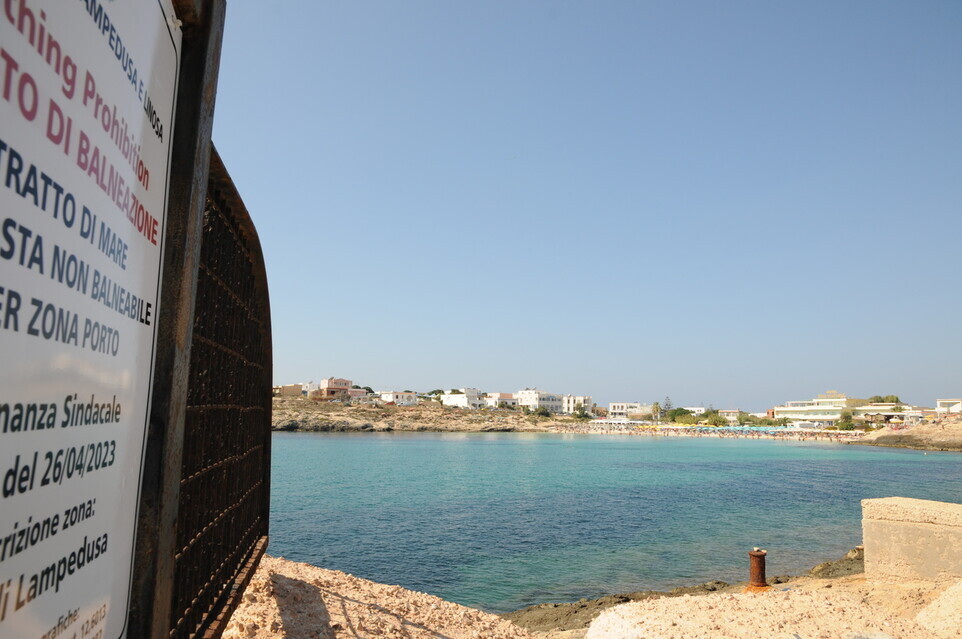hankyoreh
Links to other country sites 다른 나라 사이트 링크
[Reporter’s notebook] Hypocrisy and injustice in Europe’s treatment of migrants

“When an Italian is going to Africa, a lot of the times, they don’t need a visa. They just have to buy a plane ticket. In contrast, an African has to go through countless bureaucratic processes in order to come to Europe. What distinguishes the two? This is the injustice that exists right now.”
This is what 28-year-old Salih Haila told the Hankyoreh on Lampedusa, Italy’s southernmost island where more than 130,000 migrants to Europe arrived from Africa this year alone. For two years, he worked on this island confronted with a humanitarian emergency, helping rescue migrants crossing the Mediterranean. He himself is a second-generation immigrant who came to Italy from West Africa with his parents. For most Africans, passports are meaningless.
The coincidental conversation with Salih, who came to the island to commemorate the 10-year anniversary of the deaths of 368 migrants on the shores of Lampedusa Island on Oct. 3, 2013, was unforgettable. Connecting the current migrant issue with Europe’s colonization of Africa in the past, he said Europe was hypocritical for its anti-immigration policy.
“Historically, the West colonized Africa for hundreds of years. Africans were forcibly taken and exploited as Europeans pleased for free. Now, the West is sufficiently developed, and everything is good. But now they say they do not want Africans. What is this if not hypocrisy?”
Many of those who lost their lives in the coastal waters of Lampedusa 10 years ago were from Eritrea, Italy’s first colony. Starting in the 1880s, European countries competed for colonies in Africa for economic and strategic advantages.
Britain seized Sudan and most of southern Africa, while France took over western and northern Africa. Germany, Belgium, Italy, Portugal and more soon joined the “scramble for Africa,” making it so that very few nations in Africa can say they were free from colonial domination by one of the major Western European powers.
Despite this, campaigns that call migrants a threat to national interest are gaining strength across Europe.
“The media talks about migrant issues, but they don’t do a good job covering why it is that migrants are taking these risks or how their lives change when they get to Europe,” said Ali, a migrant from Mali who now runs a hostel in Sicily. “Instead, politicians create hatred and fear of migrants.”
Migrants who settle in Europe are seldom spoken of in terms of their positive contributions to society, but instead are portrayed as job-stealers and criminals. A majority of migrants make the difficult decision to give up everything they have and embark on the perilous voyage to Europe for any of a variety of reasons, including hunger, war, dictatorship, religious persecution, and the climate crisis.
That Europe needs immigrants as it deals with labor shortages due to a declining population, and that migrants play a huge role in economic development are not novel ideas. But what must not be forgotten is that all people have the right to pursue a better life.
The words of Vito Fiorino, an older resident of Lampedusa who was among the first to begin saving people from the tragic shipwreck 10 years ago, take on new weight.
“Every person should be able to live freely, fairly and safely in their own country.”
By Noh Ji-won, Berlin correspondent
Please direct questions or comments to [english@hani.co.kr]

Editorial・opinion
![[Editorial] Intensifying US-China rivalry means Seoul must address uncertainty with Beijing sooner than later [Editorial] Intensifying US-China rivalry means Seoul must address uncertainty with Beijing sooner than later](https://flexible.img.hani.co.kr/flexible/normal/500/300/imgdb/original/2024/0517/8117159322045222.jpg) [Editorial] Intensifying US-China rivalry means Seoul must address uncertainty with Beijing sooner than later
[Editorial] Intensifying US-China rivalry means Seoul must address uncertainty with Beijing sooner than later![[Column] When ‘fairness’ means hate and violence [Column] When ‘fairness’ means hate and violence](https://flexible.img.hani.co.kr/flexible/normal/500/300/imgdb/original/2024/0516/7417158465908824.jpg) [Column] When ‘fairness’ means hate and violence
[Column] When ‘fairness’ means hate and violence- [Editorial] Yoon must stop abusing authority to shield himself from investigation
- [Column] US troop withdrawal from Korea could be the Acheson Line all over
- [Column] How to win back readers who’ve turned to YouTube for news
- [Column] Welcome to the president’s pity party
- [Editorial] Korea must respond firmly to Japan’s attempt to usurp Line
- [Editorial] Transfers of prosecutors investigating Korea’s first lady send chilling message
- [Column] Will Seoul’s ties with Moscow really recover on their own?
- [Column] Samsung’s ‘lost decade’ and Lee Jae-yong’s mismatched chopsticks
Most viewed articles
- 1[Editorial] Transfers of prosecutors investigating Korea’s first lady send chilling message
- 2[Exclusive] Unearthed memo suggests Gwangju Uprising missing may have been cremated
- 3[Column] US troop withdrawal from Korea could be the Acheson Line all over
- 4S. Korea “monitoring developments” after report of secret Chinese police station in Seoul
- 5[Editorial] Intensifying US-China rivalry means Seoul must address uncertainty with Beijing sooner t
- 6‘Shot, stabbed, piled on a truck’: Mystery of missing dead at Gwangju Prison
- 7Could Korea’s Naver lose control of Line to Japan?
- 8Xi, Putin ‘oppose acts of military intimidation’ against N. Korea by US in joint statement
- 9US has always pulled troops from Korea unilaterally — is Yoon prepared for it to happen again?
- 10Korea’s first openly trans athlete hopes to prompt a discussion by competing as herself